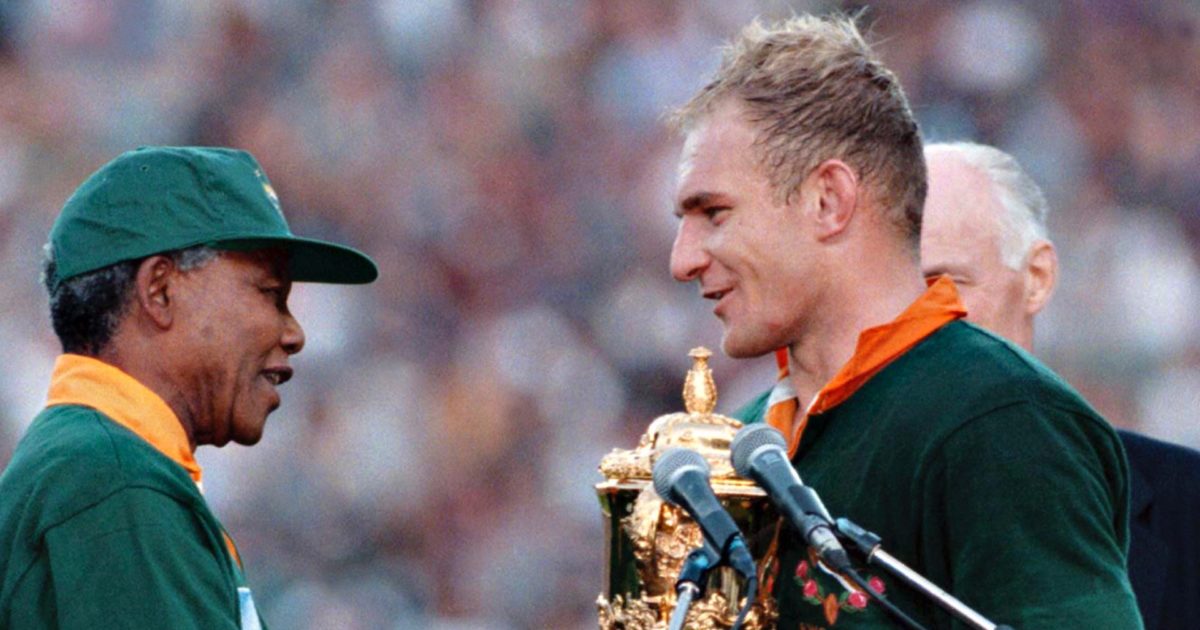The brave decision that won 1995 World Cup: 'We cancelled back row move and overruled Pienaar, which not many people do'

Joel Stransky has recounted the moment he struck the extra-time drop goal that proved to be the winning score in the iconic 1995 Rugby World Cup final. The Springboks had only just returned to the sporting fold following years of isolation due to apartheid.
Hosting the finals gave the self-styled Rainbow Nation their opportunity to show a united front and it all culminated in a wonderful June day 25 years ago when Stransky landed the points that finally broke New Zealand’s resistance and left Francois Pienaar accepting the trophy from Nelson Mandela.
The World Cup final in Johannesburg was tied following 80 minutes, but Stransky had no fears about the Springboks delivering in extra-time as he felt they were the fitter team and this conditioning would prove decisive in the 100-minute final.
“It was probably more instinctive,” he told RugbyPass, recounting the lead-up to his decision to strike for glory with the score tied at 12-all. “When I actually kicked it we had a back row move called and I could see from the way that we were lined up and the way the All Blacks were lined up, they had obviously studied our moves.
“We had done the move a couple of times in the tournament and I could see they had it defended and I could see exactly where (Stephen) Bachop’s focus was.
“He was focused very much on Joost (van der Westhuizen) and part of that is when you’re that focused on following the scrum-half around to the blindside, there is a little gap for the fly-half to run or kick and Andrew Mehrtens was standing a little bit wider which meant there was a bit of a gap for me to step into and make the kick.
“I called to Joost, he trusted me and sent the ball back. We cancelled the back row move and overruled Francois Pienaar, which not many people do. We sent it back and we kicked the drop.
“Kitch Christie had already said to us the fittest team will win the World Cup… when it went to extra-time at 9-all we were standing on the field fit and strong, we thought we had the upper hand.
“Going into extra-time we thought we have got the legs here, we are going to go on and win this so when the drop went over, it’s about being in the moment. The drop went over, it was a little moment of celebration – yes we are ahead now and then immediately I stopped and waited for Francois as we were running back and spoke about the next move.
“There’s still six, seven minutes left, we still have to defend like trojans, we have to stop Jonah (Lomu) from scoring and the way to do that is to get our hands on the ball and play in the right spaces of the field.
“I said to him, ‘Just make sure the guys are concentrated, make sure we win the kick-off, gather the ball. I’m going to hoof it long, let’s go straight back down there, put them into their half’… and that is exactly what happened.”
Now 52, Stransky added that it wasn’t until the World Cup tournament was over when the Springboks began to fully understand what their victory over New Zealand meant to their country. “Ultimately we didn’t appreciate how big a moment it was and to be fair, had we not won it wouldn’t have changed anything.
“The fact that we made the final already kept the country in rapture for that whole time. It already meant that Nelson Mandela, that iconic leader, could use this World Cup to unify the nation, could wear the Springboks jersey before a Rugby World Cup final and hold hands with white people and with other people from all different cultures. The political side, we only realised afterwards how massive it was.”
'It did turn sour'
Ed Griffiths' behind the scenes insight into the Springboks 1995 #RWC win 🇿🇦, the back story to the Mandela moment, confronting flag-waving fans, holding clothes hangers for luck & the lost opportunity of it all
– writes @heagneyl https://t.co/XpSHESE4cF
— RugbyPass (@RugbyPass) May 24, 2020
The out-half continued that the tone for the final was set by their forensic preparation, their focus on stopping Lomu and not backing away from the challenge of the pre-game All Blacks haka.
“There were a number of things we discussed pre the match that were really of great significance. Obviously, Jonah Lomu was a massive issue for us: how do you defend against someone so big, so strong, so good, such great feet, such a great skill set? And also we discussed how do you face up to this great challenge?
“We had seen what had happened in the past when teams hadn’t faced up to the challenge. We had seen the Aussies turn their back on it, other teams form a huddle. The overwhelming consensus in our group was the haka is one of those challenges that is laid down to you, it’s not something to fear.
“It’s to use as a self-motivator as well, to embrace the challenge, to lay down your own challenge by fronting up right there at the start and we said, ‘We’re going to face it, we’re going to look it in the eye’.
“It doesn’t matter who we are going to look at, we are going to front up and as it turned out, when we were facing the haka some of the guys got quite charged up and they started advancing. We started slowly edging towards it which in itself was quite inspiring.”












































































